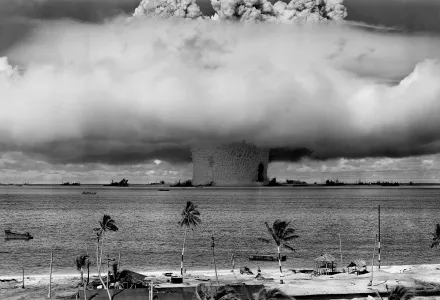Towards a Third Nuclear Age?
A Project on Managing the Atom (MTA) seminar with Andrew Futter, Professor of International Politics at the University of Leicester, UK.
A Project on Managing the Atom (MTA) seminar with Andrew Futter, Professor of International Politics at the University of Leicester, UK.

Are we on the cusp on a new nuclear age, where the rules, frameworks and ideas that govern the way in which we maintain peace in our nuclear world are set to be fundamentally altered, or at least come under pressure to be reformed? If so, what factors are driving this shift, where and why is the challenge most acute, and how can we seek to understand and manage this potentially dangerous transition? These are the questions that underpin a project which Prof. Andrew Futter began in Autumn 2020, funded by the European Research Council, which seeks to conceptualize what appears to be a global nuclear order increasingly in a state of flux due to a mixture of technological, geopolitical and normative dynamics. The aim of this talk is to provide an outline of the rationale, scope and objectives of the project, review the progress to date and present a set of initial insights and arguments for testing and discussion, and solicit advice about how to maximize the research going forward. Ultimately, the project seeks to make the case for theorizing this collective transition in nuclear order as the move towards a “third nuclear age” where we must shift our academic and policy focus and frameworks to meet the challenges of a different and potentially more challenging global nuclear condition.
Andrew Futter is Professor of International Politics at the University of Leicester, UK. He has written widely on nuclear weapons issues and the impact of disruptive emerging technology, publishing seven books and dozens of peer-reviewed and professional articles. His most recent publication is the second edition of his “Politics of Nuclear Weapons” textbook (Palgrave 2020) and his most recent monograph is “Hacking the Bomb” (Georgetown 2018), which unpacks the cyber threat to nuclear weapons. He is an Honorary Fellow at the Institute for Conflict, Cooperation and Security at the University of Birmingham and a member of the Cyber-Nuclear Threats Task Force run by the US-based Nuclear Threat Initiative. Andrew was previously a Visiting Fellow at the Norwegian Nobel Peace Institute in Norway, the Center for Arms Control and Nonproliferation in Washington DC, and the James Martin Center for Nonproliferation Studies in Monterey, California, and a member of the Euro-Atlantic Next Generation Leaders Network. He is currently working on a 5-year, £1.5million project funded by the European Research Council investigating the technological and political drivers of a shift towards a Third Nuclear Age.